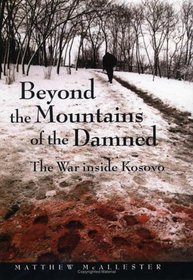Search -
Beyond the Mountains of the Damned: The War Inside Kosovo
Beyond the Mountains of the Damned The War Inside Kosovo
Author:
Winner, Publishers Weekly Best Books of 2002, Non-Fiction "In badly constructed books, the reader doesn't care what happens on the next page. In well-constructed books, the reader can't wait to see what happens on the next page. This book is a rare, third kind: The reader dreads what will happen on the next page. Nevertheless, he feels co... more »
Author:
Winner, Publishers Weekly Best Books of 2002, Non-Fiction "In badly constructed books, the reader doesn't care what happens on the next page. In well-constructed books, the reader can't wait to see what happens on the next page. This book is a rare, third kind: The reader dreads what will happen on the next page. Nevertheless, he feels co... more »
ISBN-13: 9780814756607
ISBN-10: 0814756603
Publication Date: 12/12/2001
Pages: 224
Rating: 1
ISBN-10: 0814756603
Publication Date: 12/12/2001
Pages: 224
Rating: 1
2.5 stars, based on 1 rating
Publisher: NYU Press
Book Type: Hardcover
Other Versions: Paperback
Members Wishing: 0
Reviews: Amazon | Write a Review
Book Type: Hardcover
Other Versions: Paperback
Members Wishing: 0
Reviews: Amazon | Write a Review
Genres:
- History >> Europe >> Albania
- History >> Europe >> Eastern
- History >> Europe >> General
- History >> Europe >> Serbia
- History >> Military >> General
- History >> World >> 20th Century




